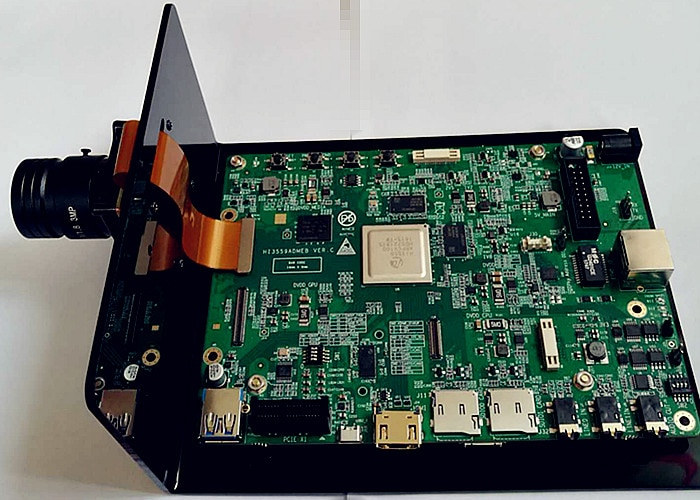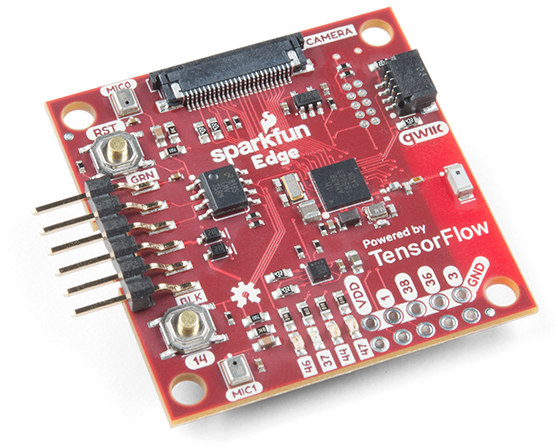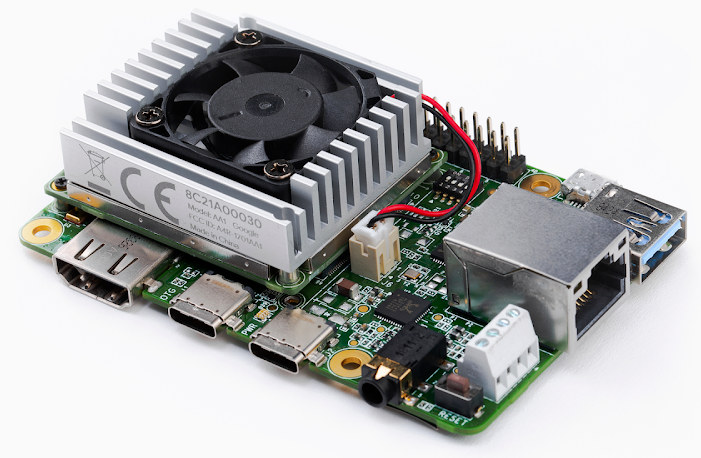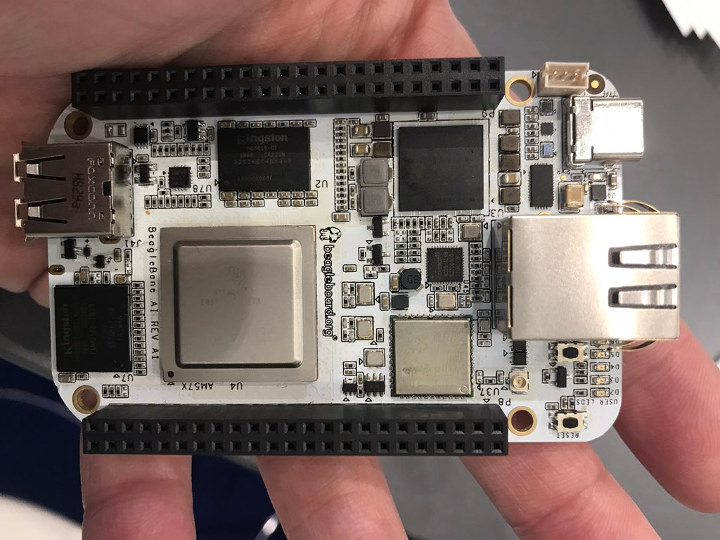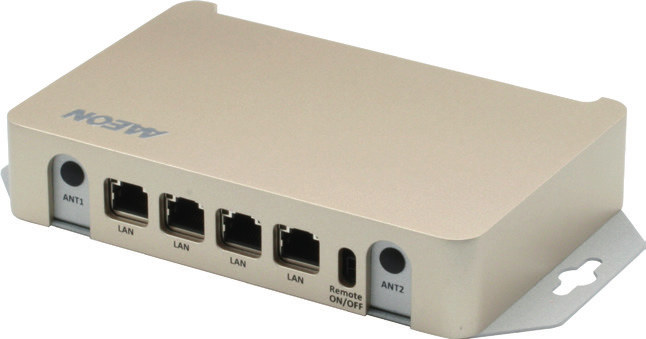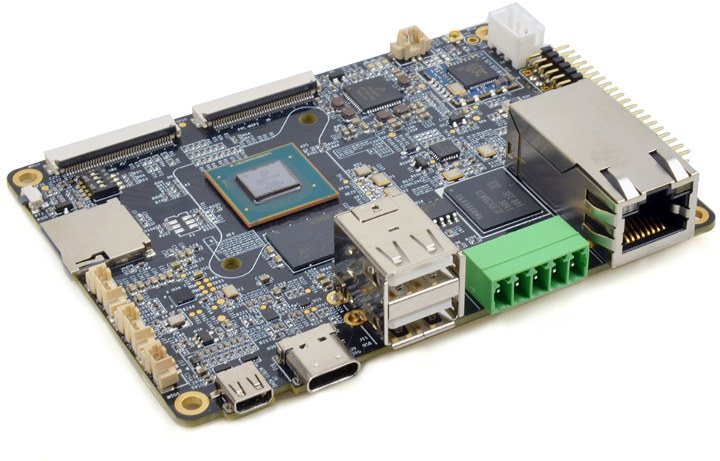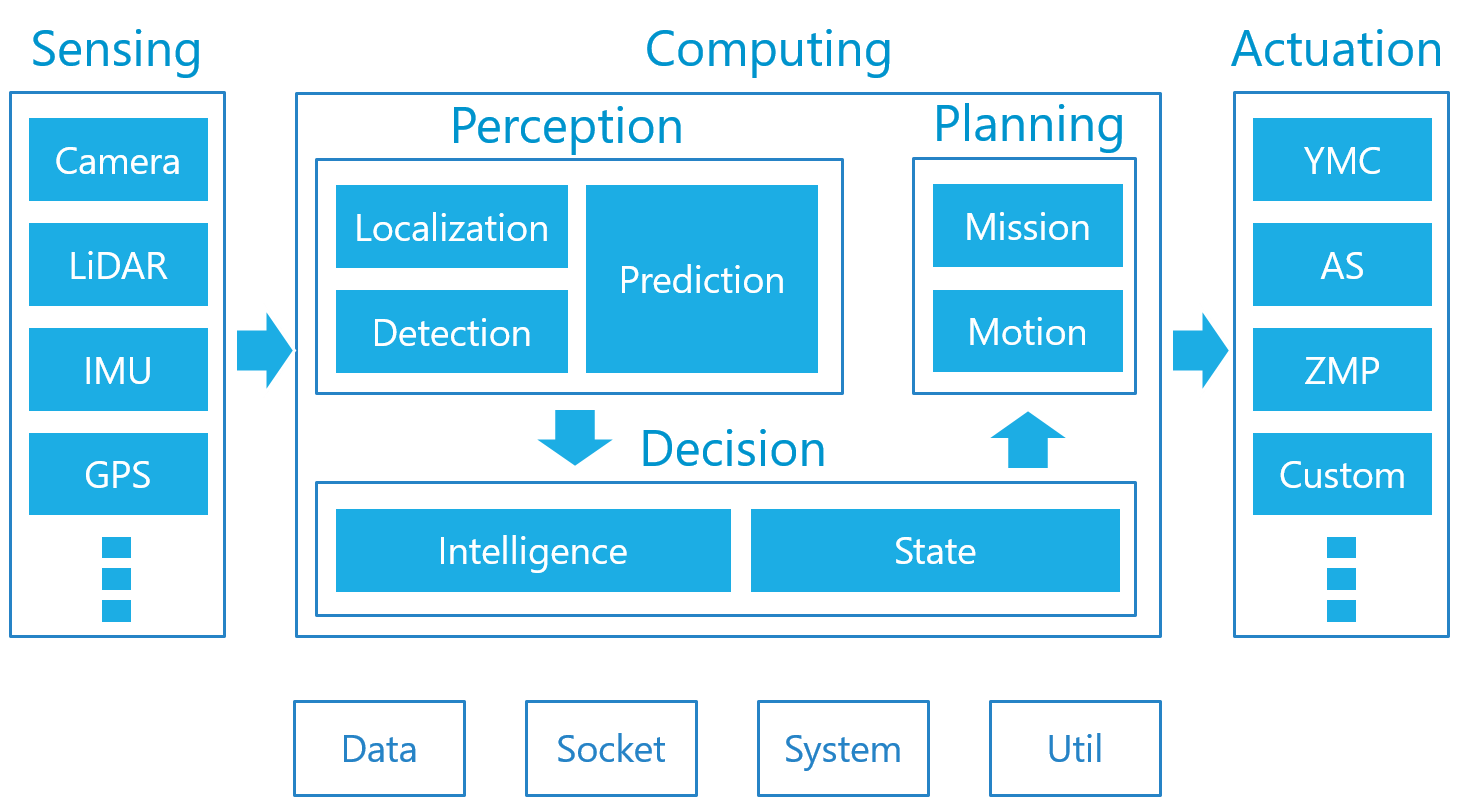HiSilicon Hi3559A 5-core Arm Cortex A73/A53 camera processor was announced in 2017 with support for 8K 30fps or 4K 120fps video recording, as well as an integrated dual core neural network accelerator (NNA). It should not be confused with the earlier Hi3559 4K 30 fps processor, or the newer Hi3559C that looks to be the same as Hi3559A without the NNA. Nevertheless, today I was lead to check about Hi3559A processor once again, and I could not find any camera that you can just buy and use today. I still found some upcoming Hi3559A products with OBSBOT Tail AI camera offered for as low as $509 on Kickstarter (delivery scheduled for April 2019), one 4K 120fps OEM? camera from GKuvision, as well as an HiSilicon Hi3559A development board for 8K camera applications, which I’ll look into more details in this blog post. HI3559AV100DMEB specifications: SoC – Hisilicon Hi3559A V100 with […]
$15 Sparkfun Edge Board Supports Tensorflow Lite for Microcontrollers
The 2019 TensorFlow Dev Summit is now taking place, and we’ve already covered the launch of Google’s Coral Edge TPU dev board and USB accelerator supporting TensorFlow Lite, but there has been another interesting new development during the event: TensorFlow Lite now also supports microcontrollers (MCU), instead of the more powerful application processors. You can easily get started with Tensorflow Lite for MCU with SparkFun Edge development board powered by Ambiq Micro Apollo3 Blue Bluetooth MCU whose ultra-efficient Arm Cortex-M4F core can run TensorFlow Lite using only 6uA/MHz. SparkFun Edge specifications: MCU – Ambiq Micro Apollo3 Blue 32-bit Arm Cortex-M4F processor at 48MHz / 96MHz (TurboSPOT) with DMA, 1MB flash, 384 KB SRAM, 6uA/MHz power usage, Bluetooth support. Connectivity – Bluetooth LE 5 (on-chip) + Bluetooth antenna Camera – OV7670 camera connector Audio – 2x MEMS microphones with operational amplifier Sensor – STMicro LIS2DH12 3-axis accelerometer Expansion – Qwiic connector, […]
Google to Launch Edge TPU Powered Coral Development Board and USB Accelerator
Several low power neural network accelerators have been launched over the recent years in order to accelerator A.I. workloads such as object recognition, and speech processing. Recent announcements include USB devices such as Intel Neural Compute Stick 2 or Orange Pi AI Stick2801. I completely forgot about it, but Google also announced their own Edge TPU ML accelerator, development kit, and USB accelerator last summer. The good news is that Edge TPU powered Coral USB accelerator and Coral dev board and are going to launch in the next few days for respectively $74.99 and $149.99. Coral Development Board Coral dev board is comprised of a base board and SoM wit the following specifications: Edge TPU Module SoC – NXP i.MX 8M quad core Arm Cortex-A53 processor with Arm Cortex-M4F real-time core, GC7000 Lite 3D GPU ML accelerator – Google Edge TPU coprocessor delivering up to 4 TOPS System Memory – […]
TI AM5729 Powered BeagleBone-AI Comes with TI C66x DSP and EVE Cores
Launched in 2013, BeagleBone Black is still one of the most popular hobbyist board thanks to its many I/Os, software support, and affordable price with being the cheapest board around those days. But it looks like we’ll soon have a new version that allows to experiment with artificial intelligence workloads. BeagleBone-AI is powered by Texas Instruments AM5729 SoC equipped with TI C66x digital-signal-processor (DSP) cores and embedded-vision-engine (EVE) cores supported through a TIDL (Texas Instruments Deep Learning) machine learning OpenCL API. BeagleBone-AI preliminary specifications: SoC – TI AM5729 dual core Cortex-A15 processor featuring 4 PRUs, Dual core C66x DSP, and 4 EVEs System Memory – 1GB RAM Storage – 16GB on-board eMMC flash with high-speed interface Networking – Gigabit Ethernet and high-speed WiFi SB – 1x USB type-C for power and superspeed dual-role controller, 1x USB type-A host Expansion – BeagleBone Black (BBB) compatible headers Dimensions – 86.4 x 53.4 […]
BOXER-8120AI is a Compact Jetson TX2 Mini PC for Drones, Robots and Surveillance Applications
AAEON has just launched BOXER-8120AI compact mini PC based on NVIDIA Jetson TX2 processor module with 8GB RAM, 32GB storage, and four Gigabit Ethernet ports. The fanless mini PC targets smart surveillance/ security/ parking, unmanned stores, drones and robotic controllers, or any applications that can leverage Jetson TX2’s 256 CUDA cores for A.I. workloads. BOXER-8120AI Jetson TX2 Mini PC specifications: Processor Module – NVIDIA Jetson TX2 with HMP Dual Denver 2 + Quad Arm A57, NVIDIA Pascal GPU with 256 CUDA cores, 4K (HEVC) video encoder, 4K 12-bit video decoder System Memory – 8GB LPDDR4 @ 59.7 GB/s Storage – 32GB eMMC 5.1 flash, MicroSD slot Display Interface – HDMI 2.0 type A Networking – 4x 10/100/1000Base-TX Ethernet USB – 2x USB 3.0 ports, 1x micro USB OTG port Serial – 2x COM ports (DB9) Misc – Power Button, Power LED, 2x SMA Holes, Remote Power On/Off Power Supply – […]
Pico-ITX i.MX8M Board Enables Offline Voice Control with Snips
A few days ago, we covered Estone Technology’s MJ-100 RK3399 rugged tablet. I’ve just realized Estone Technology used to promote their embedded product under the Habey USA brand, which we covered a few times here, and the company has also announced another new product ahead of Embedded World 2019 with their EMB-2238 Pico-ITX i.MX8M board specifically designed for voice control applications. The company setup two voice control demos with the board: one with Amazon Alexa Voice Service (AVS) and another with Snips that works locally without any Internet connection. We actually came across Snips previously for an article comparing microphone arrays, but I never looked into Snips into details or saw an actual demo. Let’s have a quick look at EMB-2238 board specifications first: SoC – NXP i.MX 8MQuad with 4x Arm Cortex-A53 cores @ 1.5GHz, 1x Arm Cortex-M4 realtime-core @ 266MHz, Vivante GC7000L/GC7000LVX with support for OpenGL/ES 3.1, OpenGL […]
Arm Helium Delivers up to 15x Performance Uplift for Machine Learning on Cortex-M MCUs
Arm has just unveiled Armv8.1-M architecture that adds Arm Helium technology, the M-Profile Vector Extension (MVE) for the Arm Cortex-M cores that will improve the compute performance of Cortex-M based microcontrollers. Helium will deliver up to 15 times more machine learning (ML) performance and up to 5 times uplift to signal processing allowing local decision-making on low-power embedded devices. Helium instructions will enable new applications for Arm Cortex-M microcontrollers in audio devices, sensor hubs, keyword spotting, voice command control, power electronics, communications and still image processing. Helium and Neon (the Advanced SIMD technology for Arm Cortex-A processors) are similarities but Helium has been designed for efficient signal processing performance in small processors. One different illustrated below is that while NEON loads 128-bit instructions (e.g. VLDR, VLMA), Helium will split up 128‑bit wide instruction into four equally sized chunks, called “beats” (labelled A to D) due to difference between Cortex-M and […]
Autoware is an “All-in-One” Open-source Software for Autonomous Driving
All major automotive companies, and some technology companies are all working on autonomous driving with the ultimate goal of achieving level 5 autonomous driving meaning no human intervention is needed at any stage. Development will take some more time, and companies are now competing with closed source software and hardware. But as I browsed through Linaro Connect Bangkok 2019 schedule, I found out there’s an open source autonomous driving software called Autoware.AI. Several “Autoware” projects are managed by the newly founded Autoware Foundation, a non-profit organization created to develop a synergy between corporate development and academic research in order to provide access to autonomous driving technology for everyone: Autoware.AI is the first version built on ROS 1, and Linux, and has been developed as a research and development platform Autoware.auto is the second version built on ROS 2, and Linux, with a complete redesign. Autoware.IO is an interface project for Autoware […]


